Genre: Sports Developer: Mindspan Technologies Publisher: Accolade Players: 1-10 Released: 1993
In 2016, the summer Olympics rocked the globe from Rio de Janeiro, as the first time being hosted in South America. I’d like to celebrate with some kind of Genesis title, but I don’t have any Olympics games! I do, however, have this cool Olympics-equivalent game, Summer Challenge. I’ve never played many sports games at all, but when I found out that Summer Challenge includes bicycling, I had to check it out! Biking is one of my favorite things in life, and I’m always curious to see any video games based on it.
The title screen won me over, right away. Behind the floating title is a stadium of microscopic people, and everything looks surprisingly realistic, with colorful flags rippling overhead that look like pre-rendered 3D. A gold coin and a silver coin spin across the screen, showing off the three-dimensional distortion of their sides as they turn. The stadium seems to be hand-drawn, along with the blue sky and puffy clouds, and the art style is interesting because the artists were attempting photo-realism, while the colors are over-saturated. Finally, there are real 3D graphics cranked out by the Genesis for some of the sports!
There are a handful of men and women characters from which to choose, and there’s the choice of which nation to represent in the tournament. The players’ animation is a bit choppy, but they also have many frames of animation (so they’re well-animated, despite being choppy). Sprites look possibly pre-rendered, or they could possibly be digitized photos, but I actually think these are hand-drawn sprites, which are meant to resemble those other styles of graphics. It’s almost impossible to distinguish the exact type of graphics used, for each part of the game. The general theme is realistic graphics, with 3D effects from a mixture of techniques, all thrown together at the same time. Since the Genesis lacks hardware for 3D graphics, it’s doing the impossible whenever it really does create 3D graphics, like this. So, Summer Challenge is impressive, and overly ambitious for the hardware. The 3D playfields are plain and basic, but they’re always mixed with those other types of graphics (like the character sprites, and the backgrounds), which balance out the plain-looking polygons.
The soundtrack starts humming away at the title screen, music that sounds fitting for Olympics-type event. It sounds cheerful and competitive. The style is proud FM synth, and it’s nice to hear the Genesis creating music that its hardware is well-suited for. It hums away cheerful tunes without ever trying to sound realistic, at all. After the charming little opening ceremony, and all the other screens, the events themselves take place in silence, which was probably intended to make them seem realistic (the silence also gives the events a quiet, relaxing feel.)
While everything described so far is quite positive, there is one fatal flaw during most events: The framerate of the environments have extremely choppy animation. Apparently, the developers could only figure out how to make 3D environments work by axing the frame-rate. This doesn’t bother me much personally, since I still enjoy the overly-ambitious graphics, but the extreme choppiness of the environments will probably bother most people! It’s not a matter of slow-down, either. It really seems that the animation itself is very choppy, as the polygons creep by.
Beyond the choppiness, though, we should have a decent collection of eight Olympics-style games. As mentioned, the biking drew me in, as I am an avid bicyclist, and I enjoy the biking sim, but there are quirks. First, over the years, I’ve come to the conclusion that bicycling just can’t really translate well into video games, because it’s so much slower than the car racing games we’ve all known and loved forever! Unfortunately, this is exactly the case in Summer Challenge. The on-screen speed might resemble a real-life biker’s speed, but it also seems like the slowest racing game ever made! Still, the slow racing is fun (for me, at least), because I appreciate the Genesis attempting a realistic sim of one of my favorite hobbies.
There is never anyone who appears on-track for any event besides the player him or herself. That’s fine; I enjoy biking alone! The only problem is that these events are presented as competitions, so we’re supposed to imagine that biking alone is also a race against other people that we don’t see! We could imagine that the “competitors” might have placed their own times by biking alone themselves, yet it really seems that we’re supposed to consider these events as races against people that just aren’t shown on-screen.
The biking controls are simple, tapping A or B constantly, and occasionally steering the bike slightly around a curve. It’s very monotonous! Also, as cool as the sprite looks, it’s disappointing that the bike doesn’t tilt when moving left and right like in real life and like a lot of motorcycle games. The sprite always sits on the bike straight upright, except that when the course has turns, he automatically tilts. It’s an altogether strange sim. The event ends in less than two minutes, and the rest of the events similarly have a short time-span.
Kayaking is fun with a 3D blue water course that includes the boat sometimes dropping down to lower levels of water. There are splashing sound effects, and little gates to try to pass through. Missing the gates does not affect the event, so one can happily continue kayaking the full event, regardless. Water carries the boat forward at varying speeds. The kayaker can sit there without moving and just float through the course, except when the current gets faster, he starts paddling along automatically (the automatic paddling just happens, and there’s no discernible difference in the controls). When the current is slower, and there’s no automatic paddling, pressing up makes him paddle and accelerate. A and B get held for him to steer sharply, with his paddle in the water, though he can also steer gently by just pressing left and right, and this actually seems the best way. The controls are simple – mostly just using the D-pad without touching the buttons – but they’re very unintuitive! All eight events, especially kayaking, leave us wondering why the controls aren’t just more natural and intuitive.
Running takes place on an empty red track that’s similar to the biking track, but it’s even slower and more boring. Controls are strange, of course: Tapping A or B to run and then pressing either C or Up, to jump hurdles. If we stumble on a hurdle, the event ends abruptly. The runner is unable to move left and right, as he’s restricted to a single narrow path with hurdles.
Equestrian (horseback-riding) has a flat three-dimensional ground with a grassy texture, a path to follow, and hurdles to jump over. It looks really cool but like running, the controls are confusing, although it’s really just using the D-pad to run and then pressing any button to jump hurdles. Unlike running, equestrian allows movement left-and-right, so there’s a nice feeling of freedom-of-movement, but unfortunately, this seems to make the event more complicated instead of easier.
Pole-vaulting, high-jumping, and javelin throwing are impressively rendered in 3D, yet the controls are problematic. You’re forced to tap A or B to run and then hit either C or up to perform the action. In high-jumping, the guy can hilariously miss the landing mat altogether and do a back-breaking flop onto the dirt, after which he rubs his back and complains, “Ugh! That hurt!”
Finally, archery just has a person standing and shooting arrows, with the whole three-dimensional archery course drawn in one screen. There’s a zoomed shot of the target, with the archer’s aim shaking across it (which is a fairly unique way to simulate how a person’s muscles are always slightly moving). The archers’ full-body graphics look great, and they look the most like digitized photos out of all the graphics in this title.
Finishing all eight events completes the tournament, and the tiny stadium hosts its closing ceremony in a darker light, indicating that all the events just took place in one day. FM synth hums along, and that’s it! Summer Challenge is impossible to lose, because it’s just a matter of completing the eight events, regardless how well they are performed. On the other hand, it also seems practically impossible to achieve a good score in most events, even the simple ones like kayaking and biking. Each event usually concludes with a screen showing three “competitors” who never appeared during the event, but who outperformed the human player anyway, to take the medals for first, second, and third-place. Since it seems impossible to score well in most events, there’s a lack of motivation to get better at the controls because even if we do get better, the only reward is for the events to last slightly longer.
Summer Challenge supports up to ten players, but they all have to take turns with the same one controller, which is lame. Plus, there would probably have to be at least one person who already understands the controls well enough to teach everyone else, so it’s really hard to imagine this working as a party game. After each event, there’s a replay option, which is impressive that the game is recording and recreating the actions that happen. There are on-screen buttons to replay it at normal speed, to fast-forward it, and to rewind it. It’s definitely a cool, unexpected feature, but I don’t expect anyone to use it beyond its novelty value. The simplicity of the gameplay means that there’s really nothing to learn from re-watching the events. There’s a password feature that I also don’t expect anyone to use, given how short the whole competition is. Also, there’s a training mode that’s surprisingly nice, because it lets us practice (and fail) an event, then retry it again – whereas the tournament only allows for one try, for each event.
Summer Challenge is obviously an Olympics-themed competition, which avoids the word “Olympics” or any reference to it. The developers clearly lacked any kind of official license, and they were playing it safe to avoid infringing on name or details of the famous events. All of that is understandable, but the final product is still strange to be based entirely on real-life events, which are never named! This whole 16-bit competition seems so mysterious. How would any of these athletes even know about the tournament, if it doesn’t have a name? Also, I’m left wondering if it really would have been so difficult for Sega to obtain some kind of official license from the IOC (International Olympics Committee)? Alternately, I wonder if anyone would have really cared if there was an “Olympics” game, without an official license? Would Sega have been sued? It almost seems easier to imagine that the IOC would have welcomed another video game to boost the popularity of the Olympics, so I’m inclined to think that no one even tried to ask them, and Sega just avoided the issue completely, to take the easiest, cheapest route possible.
Most armchair-athletes will probably consider Summer Challenge as borderline unplayable because of the choppy framerate and confusing controls, but on the other hand, some people will enjoy its overly-ambitious graphics and its simulations of real-life events. Its quirks don’t bother me. The choppiness is forgivable for the sake of featuring real-time 3D environments, which is “impossible” on the hardware. The graphics are colorful and realistic, with an interesting mixture of different kinds of visuals. The music is classic FM synth, and the silence during events is realistic, at least, with a few clear voice samples thrown in occasionally.
On a bad playthrough, Summer Challenge can be completed in maybe five minutes, as the events end suddenly for a missed hurdle, or biking off the path and automatically crashing. It never drags on, and the worse we play, the faster it’s over. Even then, it’s still enjoyable to see the rare 3D graphics, to hear the FM synth rocking and humming between events, and to laugh at the high-jumper breaking his back on the hard ground. So jump on your bike or go kayaking over that real 3D waterway! The audience is always ready to cheer and react when the event concludes, either by finishing the race, or maybe by steering off-course, and falling off the boat.
Hang on tight and go for the gold!
SCORE: 6 out of 10

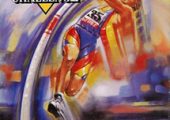
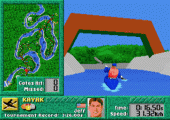
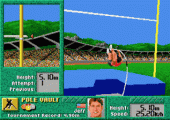
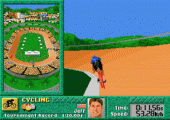
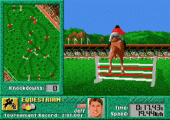
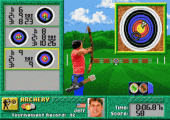
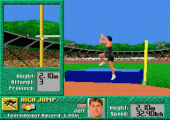
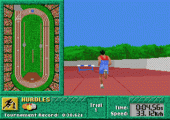
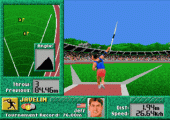
Recent Comments